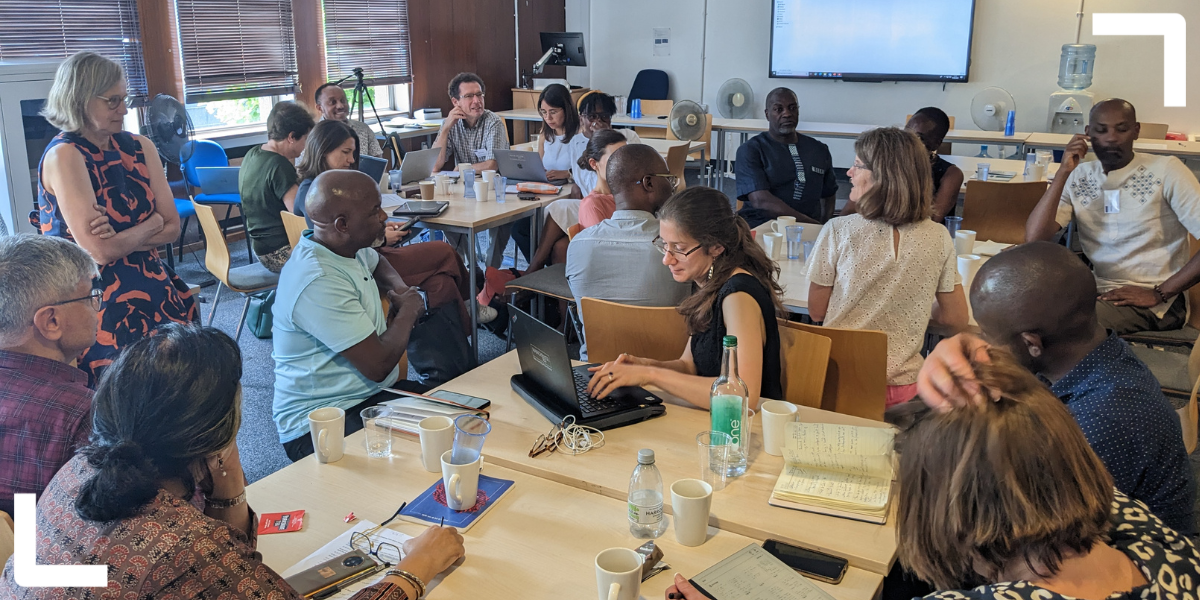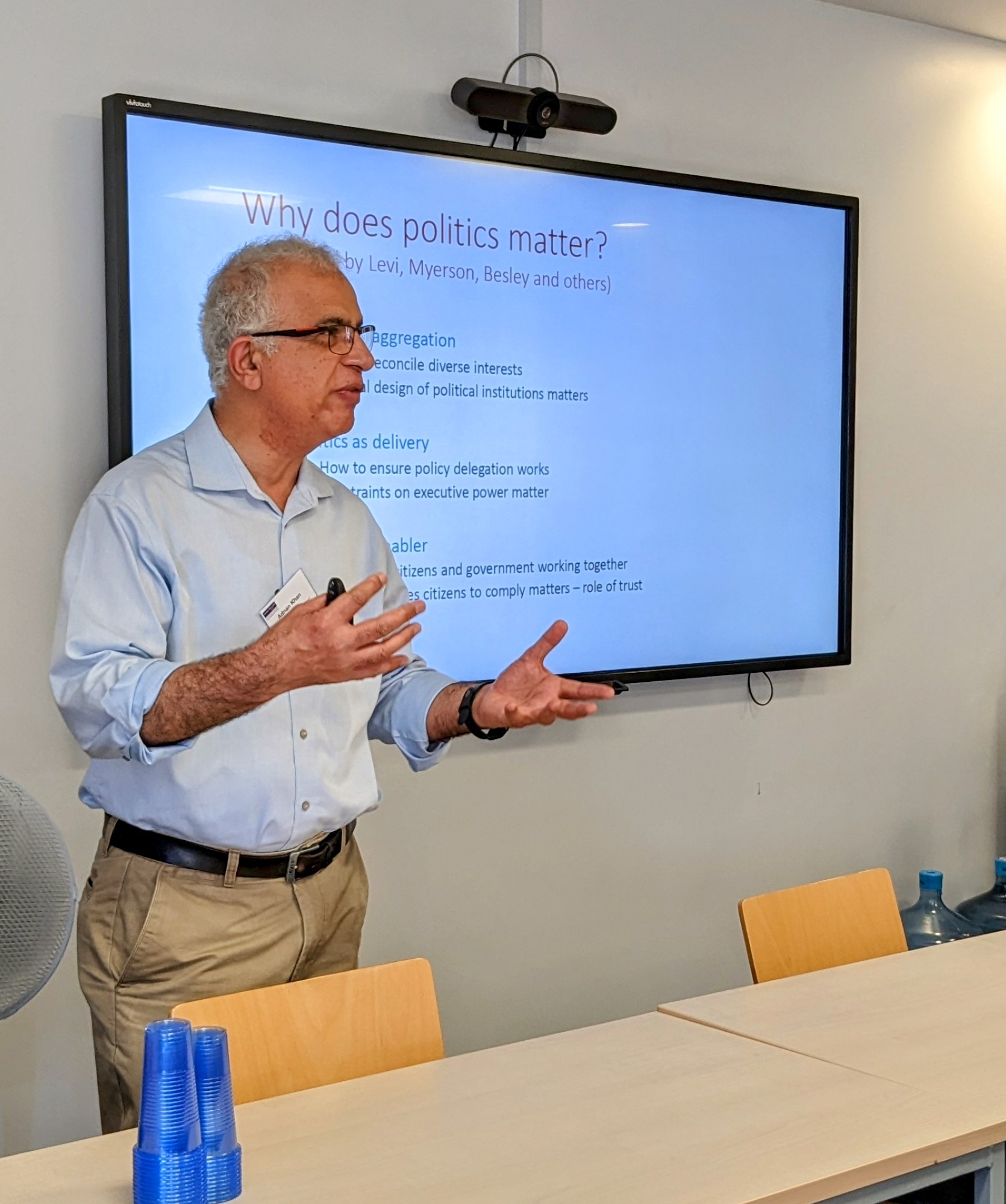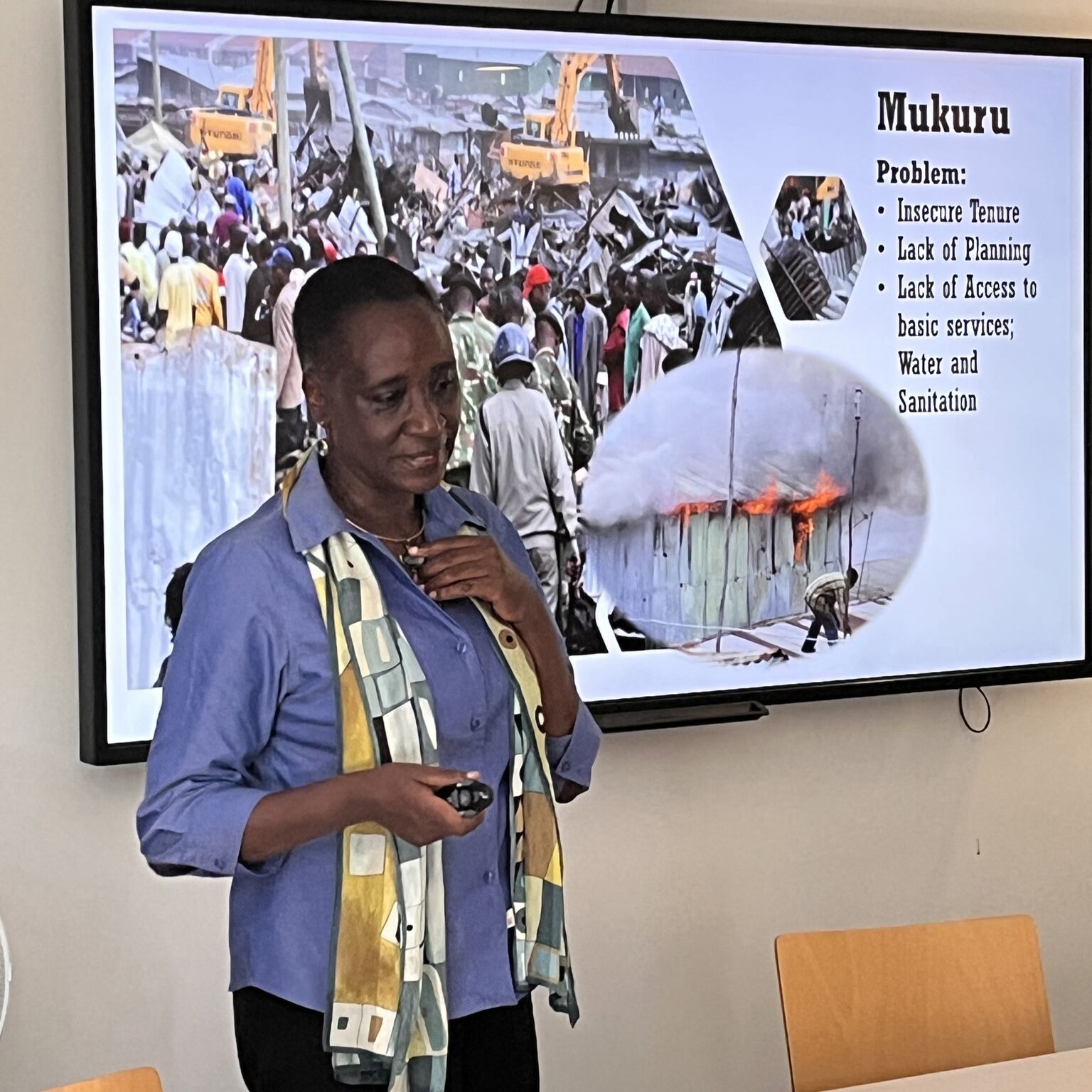By Anifat Ibrahim and Mindy Park
All roads led to The University of Manchester in June as the African Cities Research Consortium (ACRC) hosted a conference on “The role of reform coalitions for equitable, inclusive and sustainable urban outcomes”, 13–15 June 2023.
The three-day conference featured notable academics and practitioners from the global South and global North with common interests in reform coalitions and urban development, who gave 19 presentations, spread across six panels.
Day 1: Context matters
The conference was opened by Diana Mitlin, ACRC’s CEO. The first session was a keynote panel chaired by Sam Hickey, ACRC’s deputy CEO, and featuring Adnan Khan, FCDO chief economist and previously professor of practice at the London School of Economics (LSE); Shuaib Lwasa, founding coordinator of the Urban Action Lab (University of Makerere) and professor of urban resilience and global development at the International Institute of Social Studies; and Diana Mitlin.
The three panellists stressed the importance of building coalitions in advancing urban reforms, in the face of diminishing trust in public institutions. They demonstrated the dynamic process of sustaining such coalitions by paying attention to the types of actors coming together, their value systems, expectations, power relations among actors, the politics that matter in reform coalitions and the role of the state and urban elites in enabling coalitions to achieve their desired results.
The second session was on “Urbanisation, structural transformation and the contribution of coalitions”. Looking at why urbanisation has not led to structural transformation, particularly in the context of African cities, the speakers acknowledged that the potential of coalitions to bring transformative change is yet to be fully tapped. Kunal Sen (UNU-WIDER) spoke about the potential significance of such coalitions in advancing structural transformation in African cities. Vanessa van den Boogaard (ICTD) contributed reflections on the significance of coalitions in advancing tax reform, drawing on experiences in Sierra Leone, including the property tax in Freetown. Aklilu Fikresilassie (WRI Ethiopia) assessed the potential of coalitions to support the management of the lake adjacent to Hawassa, a secondary city in Ethiopia now experiencing growth catalysed by the location of a major enterprise zone.
FCDO Chief Economist Adnan Khan on the importance of politics in urban reform
The discussions suggested that power imbalances among different actors coming together in some reform coalitions can impede progressive, transformative change. There can be downsides to different actors coming together without clearly recognising their roles within the reform coalition: as Aklilu Fikresilassie, said, quoting an Ethiopian saying, “A baby with too many babysitters will be starved to death”.
The key takeaway from this session was that context matters in determining the effectiveness of reform coalitions. Coalitions contribute to, but are not the sole agents of change. Some external stakeholders can be working against the success of a reform coalition, so coalition members need to recognise these external forces and find ways of addressing power imbalances that can threaten the coalition internally.
Day 2: Coalition building from below
The third session was “Building reform coalitions: Nurturing inclusion and transformation”. The focus was on the “formation” and “spaces” of coalitions, looking closely at the spaces of participation and inclusion and the dynamics of such spaces.
Using case studies from Kenya (Martin Atela presenting the Africa-wide platforms of Utafiti Sera), South Africa (Catherine Sutherland presenting work from Durban) and the UK (Chris Jordan sharing the experience of ActionAid’s tax justice campaign), the speakers presented some remarkable urban reform coalitions that have achieved incredible results, facing unique challenges and opportunities. Speakers stressed the importance of knowledge co-production and transdisciplinarity, the diversity of relations (such as state–citizen, university–community) and the importance of communication and public dialogue in driving and sustaining inclusive and transformative urban reform coalitions.
The fourth session, “Catalysing urban reform through bottom-up coalition building”, provided concrete, real-life examples of citizen-led coalitions, featuring Kenya (Jane Weru), Zimbabwe (George Masimba and Sheila Muganyi), and the Philippines (Vanesa Castán Broto). These served as our guide towards understanding what coalition-building, knowledge co-production and politics look like in real-life contexts.
Speakers discussed the practicalities of coalition-building from below, using tools such as enumeration or savings groups. While these are important building blocks that mobilise people and keep their coalitions alive, scaling (that is, how place-based small-scale interventions bring about structural transformation) remains a key challenge.
Jane Weru from the Akiba Mashinani Trust on coalition-building in Mukuru, Nairobi
The fifth session, on “Manchester reform coalition experience”, recognised that urban challenges are not peculiar to the global South context. Although the language might be framed in slightly different ways, such as “austerity”, – as James Evans from the Manchester Urban Institute (MUI) opened the session by saying, “cities are left with less and less resources but at the same time with more and more responsibilities”. Urban coalition examples from Greater Manchester: – the “Urban Living Lab” and “Research on everyday austerity” – were shared by James Evans and Sarah Marie Hall (MUI), respectively. Their presentations re-emphasised the value and role of coalitions, knowledge co-creation, and trust-building in tackling contemporary urban challenges.
Day 3: Role of the state
The sixth and final session, on “Catalysing change: the contribution of state planning, programming and politics”, included a number of presentations that brought attention back to the role of the state. The session introduced some examples of coalitions that had been led by state agencies, who had then engaged local residents through their bottom-up processes. Somsook Boonyabancha shared experiences from the Community Organizations Development Institute in Thailand and Vincent Goodstadt expanded on the participatory processes associated with strategic planning in Glasgow. Ivan Turok offered an assessment from South Africa, drawing on both positive and negative experiences since the transition to democracy. This session also included reflections by Shalini Sinha and Jenna Harvey (WIEGO) on the experiences of disadvantaged informal worker groups who had engaged with master planning processes in Delhi to ensure that their needs and interests were taken into account. Knowledge co-production is vital, where synchronising local knowledge with technical terms (and vice versa) becomes central.
But the idea of working from the state also signifies a different kind of politics – for reformers inside the state, timing is essential. Moreover, if state officials and political imperatives are not to dominate, the approach needs to be incremental and focused on developmental learning. Coalitions should be positioned such that actors can seize political opportunities to ensure their voices are heard by the state. Strategic thinking is needed when dealing with a highly fragmented pool of stakeholders. Representatives of the reform coalition must be able to “translate” the language of the state to members of the coalition and vice versa.
Some key principles
The conference was considered to be timely, thought-provoking and enjoyable for all participants. Those taking part spoke about how valuable it had been to reflect on processes that they rarely discussed openly but which were central to their political strategies and approaches.
Diana Mitlin closed the meeting with some personal reflections on the significance of the discussions for ACRC. For her, the discussions highlighted the centrality of politics for the urban change processes presented to the meeting. However, they also highlighted the significance of systems and sectoral reform, which necessarily requires improvements to technical and managerial processes. Addressing this complexity is helped by coalition and alliance building that draws in a range of different professionals, experts and activists able to move forward in diverse ways towards a common goal. While interests and needs differed, shared values and goals appeared to underpin the coalitions presented at the conference; hence the political intent of those involved matters. This was not surprising but was significant enough to note. As proposed by Catherine Sutherland, coalitions offer grounded and empirically tested reasons to hope. Advancing the urban reform frontiers is tricky and exhausting; the positive relations that are part of coalitions help to sustain action. Finally, she suggested we have to be cautious not to “oversell” coalitions. Diverse practices and processes had been presented, as well as a range of successes and challenges.
As early career academics with a broad interest in this field, we want to close by suggesting some principles for sustaining urban reform coalitions that emerged from the discussion. These principles may be useful reminders for those who want to form a reform coalition, those who are already involved in reform coalitions and those who are reading about reform coalitions for the first time. We summarise these key principles as follows:
- Urban reform is a process, not a product.
- Politics matter, as well as the technicalities needed to drive urban reforms.
- Coalitions are made up of diverse actors, with varying values, interests and expectations.
- Knowledge co-creation among actors is a critical engine for driving coalitions.
- Coalitions bring hope and much more. They are spaces for experimentation and knowledge production.
For those who took part in the conference, this was only the beginning of many more conversations on the role of reform coalitions in equitable, inclusive and sustainable urban outcomes. We look forward to seeing more effective urban reform coalitions in different parts of the world.
Header photo credit: Chris Jordan. Researchers discuss urban reform coalitions on day 3 of the conference.
Note: This article presents the views of the author featured and does not necessarily represent the views of the African Cities Research Consortium as a whole.
The African Cities blog is licensed under Creative Commons Attribution-NonCommercial-NoDerivatives 4.0 International (CC BY-NC-ND 4.0), which means you are welcome to repost this content as long as you provide full credit and a link to this original post.




